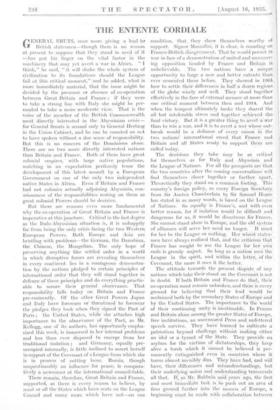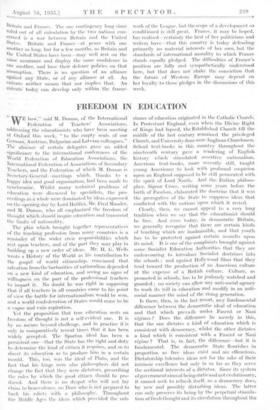THE ENTENTE CORDIALE G ENERAL SMUTS, once . more giving a lead
ter British statesmen—though there is no reason at present to suppose that they stand in need of it' -has put his finger on the vital factor in the machinery that inay yet avert a war in Africa. " I think," he said,: " it will shake the whole system of civilization to its foundations should the League fail at this critical moment,". and he added, what is more immediately material, "that the issue might be. decided by the presence or absence of co-operation between Great Britain and France ; if they were to take a strong line with Italy moreshe. might .be per- suaded to take a ore moderate view.' That is the voice of the member of the British Commonwealth most direetlY interested in the Abyssinian crisis— for General Smuts is second only to General Hertzog in the Union Cabinet, and he can be counted on not to have spoken without a due sense of responsibility. But this is no cOficern of the Dominions alone. There are no Iwo'. more directly' interested nations than Britain and France. Both of them have great colonial empires, with large native populatiOns, watching in an expectation perilously tense the development of this latest assault by a European Government on one of the only two independent native States in Africa. Even if Britain and France had not colonies actually adjoining Abyssinia, con- sciousness of the responsibilities resting on them as great colonial Powers should be. decisive.
But there are reasons even more fundamental why the co-operation of Great Britain and France is imperative at this juncture. Critical in the last degree as the Italo-Abyssinian situation, is, it is unhappily far from being the only crisis facing the two Western European Powers. Both Europe and Asia are bristling with problems—the German, the ,Danubian, the Chinese, the Mongolian. The only hope of preserving anything like settled order in a world in which disruptive forces are revealing themselVes in every continent lies in a courageous demonstra7 tion by the nations pledged to certain principles of international order that they will stand together in
defence of those -'
.principles and do everything practic able to secure their general observance. That responsibility falls today on Britain and France pre7eminently. Of the other Great Powers Japan and , Italy have fOrsWorn or threatened to forswear the pledges they took when they signed the Pact of Paris ; the United States, ivhile she attaches high importance to the observance of the Pact, as Mr. Kellogg, one of its authors, has opportunely empha- sized this week, is immersed in her internal problems and less than ever disposed to emerge from her traditional isolation ; and Germany, equally pre- occupied internally, is little inclined to assert herself in support of the CoVenant of a League from which she is in process of cutting loose. Russia, though unqUestionably au influence for .peace, is compara: tively a newcomer at the international council-table.,
There remain, therefore, Great Britain and France, supported, as there is every reason to believe, by most or all the States which have seats on the League Council and many more which have not—on one
condition, that they show themselves worthy of support. Signor Mussolini, it is clear, is counting or Franco-British disagreement. That he would persist in war in face of a demonstration of united and unwaver-7 ing . opposition headed by France and Britain is unbelievable. The two nations. have .a unique opportunity to forge a new and better entente than ever cemented them before. They showed in 1904,, ' how to settle their differences in half a dozen regions of the globe wisely and well. They stood together effectively in the face of external menace at more than one critical moment between then and 1914. And when the tempest ultimately broke they shared the 1 all . but intolerable stress and together achieved the,• final victory. But it is a greater thing to avert a.;i0far than to win a war, and. it is to avert a war whoseout-: break would be a defiance of every canon in the two nations' international creed . that FranCe and Britain and all States ready to support them are called today. .
The decisions they take, May be .as critical, for themselves as for Italy and Abyssinia and:,
the League of Nations. For all the OrospeetS are. that , the two countries after the coming conversations' will. find themselves closer together or further. aPart.
Theoretically they stand on a common footing. 'This , .
country's foreign policy, as every Foreign Seeretary. from Sir Austen Chamberlain to Sir SaMuel Hoare has stated in as many words, is based on the League of Nations. So equally is France's, and with even better reason, for if isolation would be difficult and : dangerous for us, it would be disastrous for France. She cannot stand alone in Europe, and the old system of alliances will serve her need no longer. It Must for her be the League or nothing. Her wisest st;ites- men have alwaYs realized that, and the critieis»1 that France has sought to use the League' for her own ends is grossly unjust. So long as a nation.uSes the League in the spirit, and within the , letter, of the
Covenant, the more it uses it the, better, .. . The attitude towards the present dispUte of any nations which take their stand on the Covenant is not in doubt. If both Britain and France do that,. their co-operation must remain unbroken, and there is every ground for believing that their lead , would be acclaimed both by the secondary States of FAirOpe and , by the United States. The importance to 'the World
of their continuing unity is inestimable:., 'In France and Britain alOne among the greater States of Europe, free institutions, an uncensored Press and, unfettered speech survive. They have learned to cultiVate a patriotism beyond challenge, withoirt making either an idol or a tyrant of the State. They 'pro'vide an asylum for the victims of dictatorships, they keep alive a torch which it' cannot be : believed is per- manently extinguished even in countries : where it burns alMostinviSiblY dim. They have had, and will have, their ' differendes and misunderstandings, but their underlying union and understanding transcends all that. If, as Mr. PaldWin said' years ago, the first. and most immediate task is . to push out an area of: firm ground further into the morass . of Eurbpe,. a beginning must be made with collaboration between Britain and France. The one contingency long since ruled out of all calculation. by 'the two nations con- cerned is a war between Britain and the United States. —Britain and France—at peace with one anothet'as long, but for a few months, as Britain and the United States have been--May Well rest on the 6ain e assurance and display the same confidence in One anOther, and base their defence policies on that '1.stiiirnition. There is no question of an alliance against any State, or of any alliance at all. An entente neither means that nor implies that. An entente' today can deVelOp only within the frame:
work of the League, but the scope of a development so conditioned is still great. France, it may be hoped, has realised—certainly the best of her politicians and writers have—that this country is today defending primarily no material interests of her own, but the standards of international morality to which France stands equally pledged. The difficulties of France's position are fully and sympathetically understood here, but that does not shake the conviction that the future of Western Europe may depend on her loyalty to those pledges in the discussions of this week.



































 Previous page
Previous page